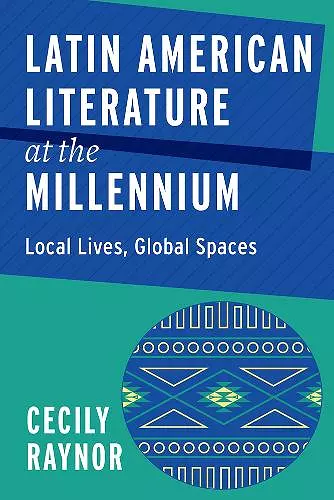Latin American Literature at the Millennium
Local Lives, Global Spaces
Format:Paperback
Publisher:Bucknell University Press,U.S.
Published:16th Apr '21
Should be back in stock very soon

Latin American Literature at the Millennium: Local Lives, Global Spaces analyzes literary constructions of locality from the early 1990s to the mid 2010s. In this astute study, Raynor reads work by Roberto Bolaño, Valeria Luiselli, Luiz Ruffato, Bernardo Carvalho, João Gilberto Noll, and Wilson Bueno to reveal representations of the human experience that unsettle conventionally understood links between locality and geographical place. The book raises vital considerations for understanding the region’s transition into the twenty-first century, and for evaluating Latin American authors’ representations of everyday place and modes of belonging.
“A major contribution to the study of the aesthetics and material practices of literature in Latin America today. Engaging with the Hispanophone and the Lusophone world, Raynor provides a useful account of questions of space, mobility and globalization. Compelling in its new readings of Latin American authors that have redefined literary writing in Spanish and Portuguese: Bolaño, Luiselli, Ruffato, Noll, among others.”— Ignacio M. Sánchez Prado, author of Strategic Occidentalism: On Mexican Fiction, the Neoliberal Book Market, and the Question of World Literature
"Uneven experiences of globalization in Spanish America and Brazil—as captured in turn-of-the-twenty-first-century cultural production—are the focus of Latin American Literature at the Millennium. With rich documentation and textured close readings, Raynor breathes new life into discussions on migration, acceleration, spaciality and the multitude. Through its chapters, the travails of local spaces in an integrated world come to bear on the literary historiography of the region."— Héctor Hoyos, author of Beyond Bolaño: The Global Latin American Novel
"Local Lives, Global Spaces outlines the relationship between globalization and literature in Latin America, offering a key contribution to an exciting, emerging field. Critics and scholars working in the fields of Spanish American and Brazilian literature, narrative theory, and contemporary fiction will also benefit from this book."— Catalina Quesada-Gómez, co-editor of Cámara de eco. Homenaje a Severo Sarduy
"Dr. Raynor’s book approaches globalization from an unexpected and little explored angle. Through detailed textual analysis, careful contextualization of literary works, and perspicacious dialogue with critical works, Dr. Raynor shows how Latin American literature questions entrenched (though not immutable) dynamics of power and, thereby proposes other ways of understanding not only the region’s cultural production, but also how we understand the role that world literature plays in interrogating relations of political and cultural power."— Leila Lehnen, author of Citizenship and Crises in Contemporary Brazilian Literature
"Specialists on the Latin American novel and those with an interest in Brazilian literature constitute the primary audience for this book."— Hispania
"This book will be a valuable resource to students and scholars of Latin American fiction."— Luso-Brazilian Review
"Local Lives, Global Spaces outlines the relationship between globalization and literature in Latin America, offering a key contribution to an exciting, emerging field. Critics and scholars working in the fields of Spanish American and Brazilian literature, narrative theory, and contemporary fiction will also benefit from this book."— Catalina Quesada-Gómez, co-editor of Cámara de eco. Homenaje a Severo Sarduy
“A major contribution to the study of the aesthetics and material practices of literature in Latin America today. Engaging with the Hispanophone and the Lusophone world, Raynor provides a useful account of questions of space, mobility and globalization. Compelling in its new readings of Latin American authors that have redefined literary writing in Spanish and Portuguese: Bolaño, Luiselli, Ruffato, Noll, among others.”— Ignacio M. Sánchez Prado, author of Strategic Occidentalism: On Mexican Fiction, the Neoliberal Book Market, and the Question
"Uneven experiences of globalization in Spanish America and Brazil—as captured in turn-of-the-twenty-first-century cultural production—are the focus of Latin American Literature at the Millennium. With rich documentation and textured close readings, Raynor breathes new life into discussions on migration, acceleration, spaciality and the multitude. Through its chapters, the travails of local spaces in an integrated world come to bear on the literary historiography of the region."— Héctor Hoyos, author of Beyond Bolaño: The Global Latin American Novel
"This book will be a valuable resource to students and scholars of Latin American fiction."— Luso-Brazilian Review
"Dr. Raynor’s book approaches globalization from an unexpected and little explored angle. Through detailed textual analysis, careful contextualization of literary works, and perspicacious dialogue with critical works, Dr. Raynor shows how Latin American literature questions entrenched (though not immutable) dynamics of power and, thereby proposes other ways of understanding not only the region’s cultural production, but also how we understand the role that world literature plays in interrogating relations of political and cultural power."— Leila Lehnen, author of Citizenship and Crises in Contemporary Brazilian Literature
"Specialists on the Latin American novel and those with an interest in Brazilian literature constitute the primary audience for this book."— Hispania
ISBN: 9781684482566
Dimensions: 229mm x 152mm x 15mm
Weight: 3g
190 pages